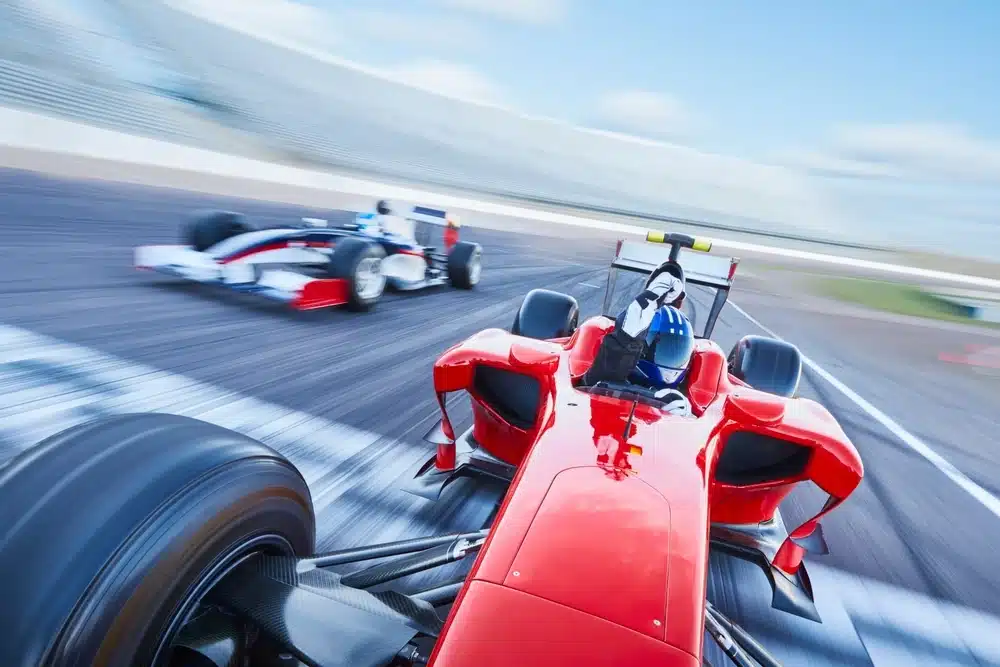
Gear up for race day wins: A beginner's guide on how to bet on F1
Formula 1 (F1) is the peak of competitive motor racing. It is one of the most watched and celebrated motorsports in the world. It’s where elite drivers from all over the world battle in some of the fastest cars ever made.
Thanks to its intense and high-stakes races, F1 has built a huge global following that draws millions to circuits. In Japan, the sport’s presence is just as powerful. Local fans show up in thousands each year, especially at the legendary Suzuka Circuit.
With F1 races growing more and more popular, F1 sports betting has become a major way for bettors to engage in the thrill. If you’re new to the sport, this F1 betting guide covers everything you need to know. Enter the world of sharp turns and smart bets, and see where your wagers can take you.
What is F1 (Formula 1)?
Formula 1 is the highest class of international motorsport racing. The event is managed by the Fédération Internationale de l'Automobile (FIA), and began its first championship season back in 1950. The sport features single-seater, open wheel cars built for extreme speed, with advanced aerodynamics, and strict technical precision.
Over the years, F1 has notably evolved and introduced cutting-edge car designs, improved safety systems, and expanded into new global markets. Yearly, fans would gather to witness drivers from world-class teams compete across regions, each of them racing to secure the World Championship title.
In recent seasons, the sport’s attendance has reached new heights. The 2025 British Grand Prix alone recorded more than 500,000 attendees over the race weekend. Back in 2024, F1 saw a total of 6.53 million spectators overall, showing how massive and passionate the global fanbase has become.
Popularity of F1 in Japan
F1 has long been a favourite in Japan. The sport gained traction during the 1970s and rose to prominence in the 1990s, particularly during championship-deciding races held at the Suzuka Circuit. Back then, grandstands were packed every year. Although the hype slowed in the early 2000s, post-pandemic seasons have revived national interest even stronger.
The latest F1 Japanese Grand Prix, held at Suzuka in April, drew 266,000 attendees across the three-day event. This was the highest record since the race returned to Suzuka in 2009.
Many credit this surge to the so-called ‘Tsunoda effect.’ This is connected to Red Bull Racing’s announcement of Tsunoda Yuki joining as their latest driver. This marked the first time a Japanese racer was part of a world-class team, which drew both attention and pride from local fans.
How do F1 seasons work?
The F1 Champion isn’t decided after finishing a single race. Instead, it follows a series of races (called Grand Prix) held across different countries throughout the year. These events make up a complete season, with each race offering drivers a chance to collect points until the final race.
Each win, a podium finish or even a top-ten place matters. The driver and the team with the highest total points at the end of the season are crowned champions. For punters looking to start F1 betting, this format helps you assess drivers based on both stats and performance across tracks.
To help you understand more, here is a detailed guide about how F1 seasons work.
F1 Rules and Regulations
One thing that sets F1 apart from other racing series is that it follows a strict rulebook to maintain a fair competition among participants. All teams and drivers must adhere to the same technical, sporting, and safety guidelines set by the FIA. These rules are the ‘Formula’ for racing the tracks.
Specifically, teams must design their cars with these specifications:
- Engine: 1600cc V6 turbo-hybrid engines that blend combustion and battery for power.
- Weight: The cars, including the driver, must weigh at least 800kg.
- Fuel limit: A maximum of 100 kg/hr of fuel is allowed per race.
- Tyres: All tyres used by teams are supplied by Pirelli. They are free to pick from various types: soft, medium, or hard, and decide which ones to use based on the track and their tactics.
However, for the 2026 season, the FIA has confirmed some new rules and massive changes in some aspects:
- Fuel: The V6 hybrid engines will use 100% sustainable fuels to generate the power that’s previously derived from combustion and batteries.
- Aerodynamics: Simplified floors and active aero (moving front/rear wings) will replace the DRS. This will minimise drag on straights but enable drivers to take corners faster.
- Weight: New cars will weigh 30kg less, down to a minimum of 768kg.
- Tyres: Pirelli will still supply the tyres. However, sizes are trimmed by 25mm for fronts and 30mm for rears.
During big race weekends, F1 follows a points system to help decide which ones will take the season’s title. Before, drivers who achieved the fastest lap during a race could earn an extra point. This allows them to rack up more points and boost their chances of taking the trophy home. However, the extra points rule was abolished starting the 2025 season. Here’s a quick look at the points system:
| Driver’s finished position | Points given |
| 1st | 25 points |
| 2nd | 18 points |
| 3rd | 15 points |
| 4th | 12 points |
| 5th | 10 points |
| 6th | 8 points |
| 7th | 6 points |
| 8th | 4 points |
| 9th | 2 points |
| 10th | 1 point |
F1 World Championship
The Formula One World Championship is an annual global motorsport series that brings together the world’s fastest drivers and finest teams. Every season consists of 24 Grand Prix, held across continents and every weekend. Each race weekend is split into three days:
- Friday: The race weekend opens with 60-minute Free Practice 1 and 90-minute Free Practice 2. These sessions allow teams to test their tyre sets and car setups and adjust to the track.
- Saturday: The second day focuses on the qualifying race, but with a 60-minute Free Practice 3 before it. This event is split into three parts: Q1, Q2, and Q3. This is a crucial stage as the result will determine the starting grid for Sunday’s race. The fastest in Q3 takes pole position in the main event.
- Sunday: This is the race weekend’s main event. This is where the points are earned. The team’s tyre choices, any weather shifts, and the driver’s tactics can make all the difference.
After the 24 Grands Prix, two major titles are given: the World Drivers’ Championship and the World Constructors’ Championship.
- World Drivers’ Championship: This title is awarded to the driver who earns the most points over the season. Each race contributes to the standings, and points earned are based on one’s finishing position.
- World Constructors’ Championship: This award is given to the team that accumulates the most points for the season. The results are derived from the standings of both their drivers across races.
Where to bet on F1?: Grand Prix Events at Sportsbet.io
If you’re into high-speed action and sharp strategy, F1 betting at Sportsbet.io covers all the biggest Grand Prix of the year. With 24 races each season, every race offers a fresh opportunity to bet on the most iconic circuits of Formula 1.
You can also back your picks on iconic racers and teams that have reigned in certain F1 Grand Prix, or based on the displayed bookmaker odds. Can’t pick yet? Here are four of the world-famous Grand Prix you can bet on:
F1 Japanese Grand Prix
Held at the iconic Suzuka Circuit, the F1 Japanese Grand Prix is known for its uniquely technical layout. It is the only track to feature a figure-eight layout. The design has an overpass where one track crosses another, like the number eight. This makes it extra challenging for drivers and teams. The fast corners and tight bends of the circuit often shake up the leaderboard, so it’s a fun betting event.
Monaco Grand Prix
No race matches the prestige of the Monaco Grand Prix. Since 1929, it’s been a much-awaited highlight on the F1 calendar. Set in Monte Carlo’s narrow and twisty streets, the circuit demands a high level of strategy and precision.
Being one of the Triple Crown Motorsport races, the Monaco Grand Prix is also a festive event filled with yachts and celebrities eager to watch the race.
British Grand Prix
The British Grand Prix is one of F1’s oldest and most iconic events. Hosted at the Silverstone Circuit, it was where the first ever World Championship race was held back in 1950. The track is known for its high-speed corners that test every bit of a driver’s skill. The British Grand Prix is also known for its wild weather shifts, which can greatly affect the results of the race.
Italian Grand Prix
Held at the Autodromo Nazionale di Monza, the Italian Grand Prix is best known as the ‘Temple of Speed.’ It features one of the fastest circuits in F1, with its track built for flat-out racing. The long straights and minimal corners make it an easy test for one’s top speed.
Every F1 Italian Grand Prix since 1950 has been held at the Monza circuit, except in 1980, which was at the Autodromo Internazionale Enzo e Dino Ferrari, known as the Imola circuit. The Italian Grand Prix is also often called Ferrari’s home turf after racking up a total of 21 Constructors’ title wins there.
Other F1 betting markets to wager on
You’re not just limited to race-day picks at Sportsbet.io. The platform covers a wide range of markets, which gives you more ways to bet and have more fun. Here’s a quick breakdown of F1 betting markets you can find on the site:
- Winner: Place your bet on whom you think will finish the race in 1st place.
- Podium finish: Predict which drivers will secure a top 3 finishing position.
- Constructor winner: Place a bet on the team you think will come out on top in the race this season.
- Fastest qualifier: Pick who will earn the pole position after the qualifying rounds.
- Drivers’ Championship: Bet on the driver who will end the season as champion.
If you’re looking for accurate or familiar F1 betting odds, Sportsbet.io also lets you switch between American, Hong Kong, and Decimal odds. It’s a handy feature, especially if you have a preferred format.
Factors to consider before placing an F1 bet
Formula 1 races are full of surprises. A slow pit stop, a sudden safety car on track, or even a wrong tyre call can easily cost a driver a podium finish. When checking bookmaker F1 odds, keep these factors in mind.
Before locking in your picks, it’s also crucial to understand the factors that shape F1 races. While stats and driver history matter, real-time conditions often decide how bets land.
Keep these factors in mind the next time you place an F1 bet:
- Grid position
The place where a driver starts can set the tone for the entire race. At circuits with fewer overtaking chances, like in Monaco, starting in front leads to cleaner laps and fewer risks. Those who often claim the pole position can also avoid traffic.
- Tyres
A team’s tyre strategy helps shape their driver’s race. Depending on their goal, if they aim for either speed or durability, drivers can use soft, medium or hard tyres to race. Picking the wrong set or an early pit stop could ruin a potential lead.
- Weather condition
The weather always plays a wild card in most outdoor sports. When it comes to racing under the rain, water makes grip weaker, and too much heat can wear tyres faster.
These extreme conditions can affect driver performance, and rookies may struggle. This also impacts betting odds, so keep an eye out for shifts, especially if you’re betting live.
- Track type and layout
Each Grand Prix circuit is built differently, which adds to the charm of F1. The Bahrain Grand Prix, for instance, has long straights with heavy braking zones. This allows drivers to make clean overtakes. In contrast, street tracks like Monaco’s leave only a little room for mistakes. Knowing how a driver performs on specific layouts helps you pair them with the right bet.
- Rule changes
Formula 1 is always evolving, and these seasonal changes impact race results. It can be a new car regulation or a major format change; these updated rules can shake up the grid and team tactics. Those who adapt quickly to changes often do well. If you want your bets to win, it helps to stay informed.
Payment methods for F1 betting
Placing bets should be quick and easy, just like how you could fund your betting account. With Sportsbet.io, punters in Japan can enjoy a wide variety of ways to fund their F1 bets. You can pick whichever method you think serves you well in terms of speed, control, or privacy. Here’s a quick look at what’s available at Sportsbet.io:
Fiat currency
For most bettors, placing bets using fiat currency is the simplest option. Sportsbet.io supports several local payment methods that make deposits and withdrawals easier:
- Bank transfers: Online bank transfers’ processing time can take from an hour up to 24 hours. If the deposit has not reflected yet on your account, you can reach out to customer support with a receipt or transaction slip.
- Vega Wallet: This digital wallet option is popular among Japanese punters. Deposits made through Vega Wallet are instant. This is ideal for those who love to place last-minute bets due to its speed and convenience.
Quick note: While Sportsbet.io don’t charge for deposits, your bank or wallet provider might. Always double-check for fees and their amounts before making a deposit.
Cryptocurrencies
For bettors who prefer crypto, Sportsbet.io offers full support for a handful of coins and tokens. This includes Bitcoin (BTC), Ethereum (ETH), and Tether (USDT). Crypto transfers are fast, secure, and handy for punters who want to maintain privacy even when betting.
F1 betting made simple: Wager on Sportsbet.io using JPY today
Whether you’re a seasoned fan or a beginner to the world of motorsport, F1 sportsbet options at Sportsbet.io can help you get started. The platform’s user-friendly interface, smooth payment methods, and multiple odds formats make betting easier and more enjoyable.
Use fiat or any crypto of your choice to jump straight into the action—all with full control over how and when you bet. With all the basics down on how to bet on F1, you’re all set for a fun, fast, and fair betting experience!
Frequently Asked Questions (FAQs)
What odds formats does Sportsbet.io offer for F1?
Sportsbet.io offers three odds formats for F1 betting: Decimal, American, and Hong Kong. Switch between them anytime, depending on which works best for you.
What is the schedule for the Formula 1 season?
The F1 World Championship runs across 24 Grand Prix weekends, from March to December. Each race happens over three days: Friday, Saturday, and Sunday.
How are payouts calculated in F1 betting?
Payouts depend on your pick’s odds and the bet you placed. The higher the odds, the bigger your potential reward will be.
Are there any F1 bonuses being offered at Sportsbet.io?
While there are currently no ongoing F1 bonuses on the platform, Sportsbet.io often features promos and boosted odds during big racing weekends. It’s a good idea to check the platform’s bonus and promo page during the F1 season.















